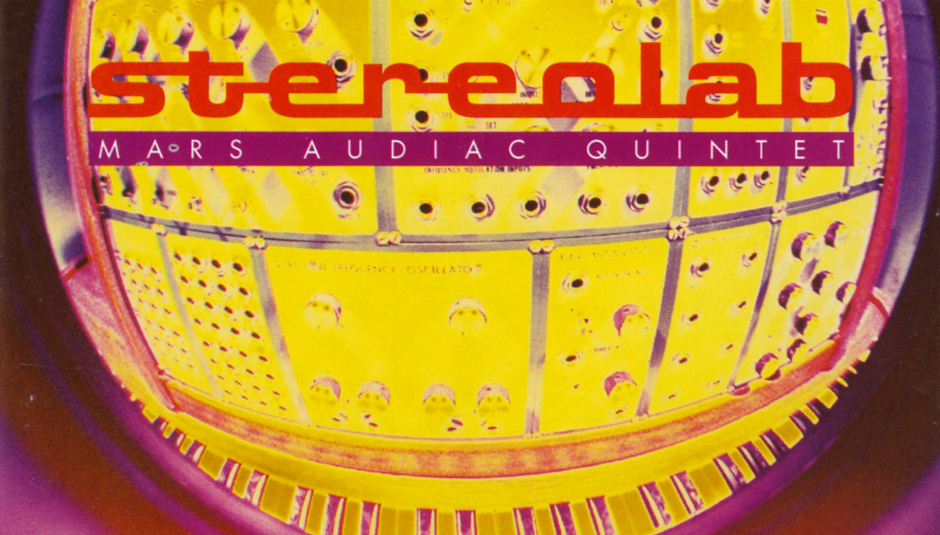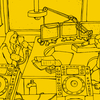"In societies where modern conditions of production prevail, all of life presents itself as an immense accumulation of spectacles. Everything that was directly lived has moved away into representation."
"...just as early industrial capitalism moved the focus of existence from being to having, post-industrial culture has moved that focus from having to appearing."
"The spectacle is not a collection of images, but a social relation among people, mediated by images."
"Quotations are useful in periods of ignorance or obscurantist beliefs."
-Guy Debord, Society Of The Spectacle
"Art is a real political tool in a sense that it is your way of acting."
-Laetitia Sadier, RBMA Interview, 2015
First there is the packaging: two LPs (and, in the original release, a bonus 7"). A giant slab of music offered under the cover image of a gleaming, yellow fish-eye orb of modular synthesizer. This represents the burning sun at the center of the record: an electrified spinal cord of, variously, Vox, Farfisa, and Moog running straight up the middle of the mix from start to finish. Tim Gane's keyboard textures and arrangements are the primary sonic element here: commanding, gravitational, pulling every other instrument into its orbit and locked into a celestial dance with the twin moons of Laetitia Sadier and Mary Hansen's vocals.
This is Stereolab's third full-length. Building on the textures and ideas of Peng! and Transient Random Noise-Bursts With Announcements, something crystallizes on Mars Audiac Quintet that further sets the band apart from the readily identifiable categories of its time. It is 1994, but this is not grunge, neither is it shoegaze. It is propelled by female voices, but it isn't riot grrrl nor is it in line with the female-fronted music that would peak several years later at Lillith Fair. It is not trip hop, and it definitely is not hip hop, though Sterolab would go on to be sampled by the likes of Busta Rymes and Madlib. Post-rock? Well, but what the hell is post-rock anyway? Always this need for boxes. But what if there is no box? What is genre anyway? Whom is genre for?
This is an emergence album. This is a world born.
Listen: 'Three Dee Melodie' opens as promised, with three dense organ chords repeating. This is the album's shimmering pole star. The sound is upbeat, dreamy. Enter the groove and the realm of two smooth, crooning, female voices. Their blurry sonic loveliness strikes first; the content of the lyrics is not immediately clear. But listen closely and you'll find yourself "Hideous on the edge of a precipice" where the soothing voices inform you that "The meaning of existence / Can't be supplied by religion or ideologies." Welcome.
Stereolab draw from many sources but worship at the altar of no unified past. The status quo is no one's friend - its purpose is to lull us into complacently trusting a social system in which we are pawns. On Mars Audiac Quintet, Sadier's lyrics offer a searing, Situationist-influenced critique of contemporary capitalism and social decay couched in some of the most lush, rose-colored music the band ever generated, and this combination is, I think, its crux. Often cited as Stereolab's "most accessible" work, it does indeed offer a widely appealing surface of sheer textural beauty and rhythmic repetition. But the sunny instrumentation is a Trojan horse of sorts, a construct that allows you blissful ignorance of what's actually going on, unless you care to inquire. The lyrics mean business, and they are here to undermine your illusions of security.
Take, for example, the cheery 'Wow And Flutter', where a bubbly synth leads into such blithely prophetic commentary as: "I thought IBM was born with the world / The U.S. flag would float forever / The cold opponent did pack away / The capital will have to follow / It's not eternal, imperishable / Oh yes, it will go." Or 'Ping Pong', where "It's alright 'cause the historical pattern has shown / How the economical cycle tends to revolve / In a round of decades, three stages stand out in a loop / A slump and war then peel back to square one and back for more...There's only millions that lose their jobs and homes and sometimes accents / There's only millions that die in their bloody wars / It's only their lives and their next of kin they are losing... Don't worry, shut up, sit down, go with it and be happy" is set in a pastoral pop jam, replete with sax and flute accents, and followed by a series of all the candy-coated "dum-de-dums" you please. If the juxtaposition of these elements weren't such a potent artistic representation their core message, it could almost read as sarcasm. That all this remains relevant in 2017 hardly needs to be said.
The synthesis of the album's melodic prettiness with its serious, critical content amounts to a political statement by way of declining to adhere to codified modes of expressing radicalism. Radicalism isn't always shouted or bellowed. It can also be crooned. It can sound like a bossa nova lullaby, as on 'Des Etoiles Electronique' and 'The Stars Our Destination'. It can sound like an update of the French new wave, as on 'L'Enfer Des Formes', where sugary la-la-la's back a castigation of complacency and the ease of submitting to manipulation. If it's sung in a language one doesn't understand, one could miss it completely. This protest is not a march in the streets. No one is beating you over the head with these politics or demanding your fealty to any dogma. No boxes will be ticked here. Tim Gane's privileging of the organ sounds that were once the signature of 1950's idealism conjoined with Laetitia Sadier's salient undermining of exactly those ideals place Stereolab's music outside of any box one might have in mind for it. What is genre anyway?
Genre can be helpful. It can serve as means by which to identify and group artists and works that share similarities in form and style, thus collectively reflecting a meaningful perspective on the society from which they emerge. When that society runs on consumerism, however, genre can too easily become the bedfellow of commodification, wherein to categorize something is to package it for sale. What does this mean for art? What does this do to art? Is the resistance of genre also resistance of the Capitalist prerogative? Perhaps. The important thing is that Mars Audiac Quintet actively begs the question.
Moon Duo release the second volume of their two-part Yin/Yang-themed album Occult Architecture on 5 May via Sacred Bones. Their European tour starts next week. For more information about the band, please visit their official website.






















